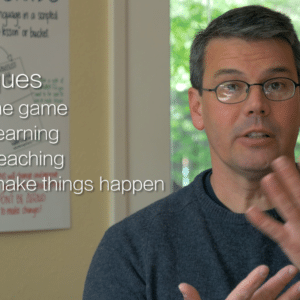
Everyone has a hand, and everyone is equal. It’s a good day to play. Credit: mrwynd, Flickr, Creative Commons
This post is third in a series of entries about WAYK techniques as they occur in everyday life, beyond language-learning. The previous two are on “Craig’s List” and “Full”.
People say “the best way to learn is to teach”, the “natural conclusion” would be that everybody would be teaching all the time. WAYK accelerates this teaching through the technique “Everybody Deals”: everyone in the Inner Circle plays a given role. For instance, the fluent speaker in the Inner Circle might have everyone Copycat what she is saying, then have the person on her left do the same, and so on along the circle until the last person is reached. “Everybody Deals” is therefore an extension of “My Turn/Your Turn” and naturally progresses to “Teach a Teacher”.
“Everybody Deals” takes its name from multiplayer card games, in which the role of the dealer is passed on clockwise for every round of play. The custom was established to make sure every person was playing fair and had the same opportunity to play well. WAYK ensures the same result: if one person is using good techniques more often, then “Everybody Deals” gives a double bonus: everyone else can then copy-cat the same techniques, making the game both faster and fairer, never creating “single points of failure”.
At Stanford, inspired by the gameplay of certain rounds of Mandarin Chinese at the November 2011 workshop, I decided to coin a name for the way we repeated a pair conversation in a circle: “Rotation Conversation”. [1] As I’d later learn, this would be a subset of “Everybody Deals”. I’ve found it’s a powerful reinforcement of learning lines because every person in the circle plays the roles of receiver and giver, one right after the other. Personally, I like “Everybody Deals” a lot more than “Rotation Conversation” because the former encompasses a lot more content and emphasizes the notion that everybody is involved.
Many sports also make use of “Everybody Deals” in having both teams play offense and defense within the same game. This arrangement motivates both teams to be competent in both roles and makes athletes’ brains more flexible; players are generally not stuck in the same role throughout the game. Everyone on a team is shuffled in and out of play; sometimes you’re on the field, other times in the bleachers.
Even around the home, “Everybody Deals” appears. You’ve had to work on your fair share of chores when you were little, but at some point so have your parents and siblings. Most likely, you didn’t have to be stuck with the same chore every day. Most likely, you lent a hand at washing the dishes, doing the laundry, taking out the trash, and mowing the lawn on certain days in the week, and your other family members worked their chores on other days.
“Everybody Deals” teaches you to be alert of what you should say next when you’re in an Inner Circle. It also forces you to be flexible; your brain should be agile and able to switch from role to role as needed, not fixed in a particular role all the time. Finally, “everybody deals” highlights and strengthens the collaborative aspect of WAYK, making sure that everyone has a chance, at some point, to play in the same way.
While we learn languages, we should never forget that languages belong to cultures and that we should embrace both languages and cultures at the same time. When we make sure “Everybody Deals”, we include everyone and build the culture around the language we hunt. This inclusion strengthens the language, the players, and the community.
[1] Alice would be giving something to Bob, sitting to her left. Afterward, Bob would then give something else to Charlie, to his left. Charlie would have the same interaction with Dana, then Dana with Emily, and finally Emily with Alice.




